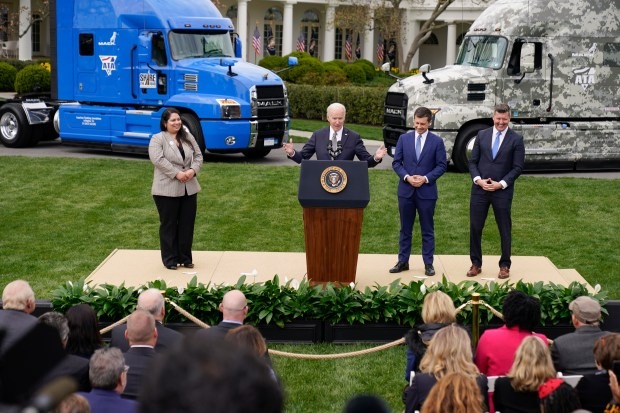By PATRICK J. MURPHY
August 11, 2022 at 7:00 a.m.
Most of us didn’t give much thought to the supply chain until our normal lives were disrupted by the pandemic. But now, these concerns have become real kitchen table issues for the first time in recent memory as families confront increasing costs and empty shelves. One area that has seen marked improvement, however, is in supply chain employment. Many veterans are to thank for this progress.
Late last year, the Biden Administration announced an initiative to get more Americans good-paying jobs in trucking. Nearly 72% of all goods in the United States that we use in our daily lives are moved by trucks.
Suffice it to say, we need a strong trucking industry to stay competitive and ensure Americans’ basic needs are met. But right now the industry is struggling and we’re all paying for it.

Patrick J. Murphy
In 2021, American Trucking Associations reported that America was short 80,000 drivers, a number expected to double by 2030. As if the driver shortage wasn’t enough, trucking costs increased by 20% last year alone — a concerning figure as the Fed recently found that most companies are passing those increased costs on to consumers.
But it’s not all bad news. One recent component of President Biden’s Trucking Action Plan includes facilitating the education and hiring of veterans and transitioning service members as professional truck drivers. And it’s working.
In April, I stood alongside the president to announce the launch of the program, officially called “Task Force Movement: Life-Cycle Pathways for Veterans and Military into Trucking.” In only four months, hundreds of veterans, transitioning service members, and their immediate family members have answered the call to serve their country once again. And hundreds more are expected to join up in the coming months.
For many veterans, this is a match made in heaven. Both my father and grandfather worked as truckers after serving in the military. They were union guys who earned enough to support their families and got health insurance and pensions. These days, the average trucker makes over $77,000 per year, well above the national average for all workers. This is an attractive option for the dozens of veterans I’ve spoken with about the program.
On Aug. 2 I joined Transportation Secretary Pete Buttigieg and U.S. Rep. Susan Wild to celebrate these achievements at Lehigh Carbon Community College — one of the early adopters of the program. This event highlighted one of the most important keys to the Task Force’s success: collaboration. It started with President Biden and Secretary Buttigieg — but we have worked alongside private companies, colleges, skills training programs, and the Department of Defense to make this program work.
Trucking is a viable career path for transitioning service members and vets, many of whom already have experience driving a big rig. If they can handle a tractor-trailer as part of a war-zone convoy, they can handle driving one here in America. That basic logic is another ingredient in the success of this program.
Many of our partner organizations eagerly stepped up to create expedited programs to ensure capable, experienced veterans could get up to speed on domestic regulations and get them out on the road. Private companies reserved trucking positions for veterans, skills training programs tailored to veterans were stood up at a rapid clip, and the DoD helped facilitate the transfer of veterans’ service records to help smooth the certification process.
At a time when it feels like the world is on fire, it’s nice to be able to celebrate something positive. It all starts with our veterans, who are selfless by their nature. But it also took dogged determination by our political leaders, good business sense mixed with love of country by the private sector, and an entrepreneurial spirit from our public colleges and skills training programs.
We face a lot of challenges, but with veterans behind the wheel, we are confident that someday soon we can report to the nation that the mission is accomplished.
Patrick J. Murphy is chairman of Task Force Movement. He previously served as the 32nd undersecretary of the Army and as a member of Congress from Bucks County.


